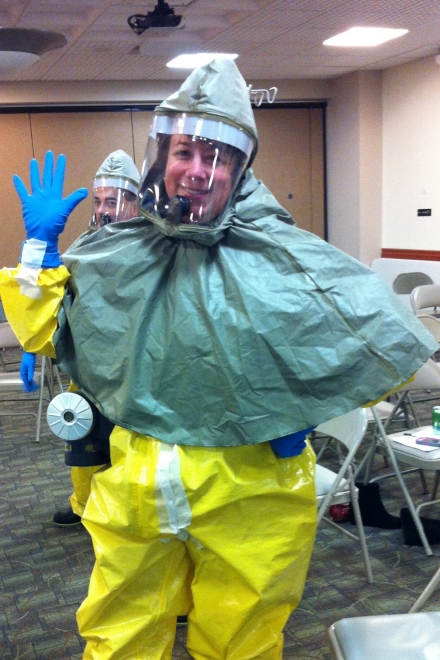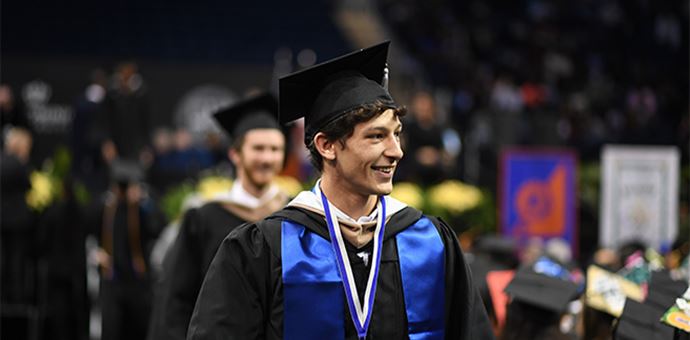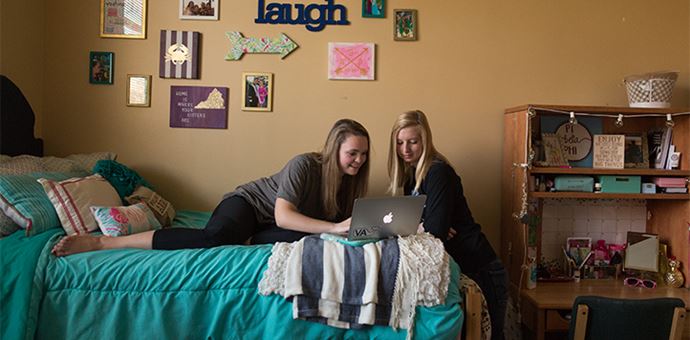Toggling from Teaching to the Front Line

Every semester, faculty at Old Dominion University's College of Health Sciences pour their hearts into preparing the next health-care providers. Many are young, innocent souls who still have so much to learn about selflessly dedicating their lives to save others and inevitably will devote themselves "to the welfare of those committed to their care," in the words of Florence Nightingale, the founder of modern nursing.
At the same time, these instructors work double-time in the field, fulfilling the same pledge. Many of these professionals now find themselves on the front lines of a pandemic that is wreaking havoc on our global population with no real end in sight. COVID-19 has changed education at ODU. It has transformed the lives of many of instructors, who have been called into action and flinch not in the face of adversity and possible infection.
ODU faculty members Lynn Wiles, Beth Tremblay and Donna Rose are but three of these health-care professionals. Their stories offer a passionate prism through which to view their efforts to support their students, help others, battle an unseen enemy, prepare for the unknown and find balance and some sense of normalcy in their own lives.
Wiles, a staff nurse at Sentara Virginia Beach General Hospital's emergency department, has been working in the emergency field longer than she has been teaching. She chose to stay in that front-line setting not only for her love for bedside nursing, but also because of the ways it informs her classroom instruction.
"I think it's critical to remain current with clinical practice given that I teach didactic and clinical courses that are acute care and patient-focused," she said. "I also love being a resource for the staff and students and enjoy working with my clinical team members to develop evidence-based practice projects and staff education."
While COVID-19 has produced its unique set of problems and fears of exposure, emergency departments are environments where exposure to diseases are a constant concern. Working in them can mean susceptibility to a host of pathogens, including HIV, hepatitis and influenza, Wiles said. That's why personal protection equipment (PPE) has become increasingly important.
"I started patient care before the Centers for Disease Control and Prevention (CDC) guidelines for standard precautions and routine glove use," she said. "Am I worried about becoming one of the positive? Absolutely! ... I'll protect myself as best as I can - but I do worry."
Since the COVID-19 pandemic, Wiles' life has transformed into a dizzying juggling act. Balancing her work among ODU, the emergency department and the home has been challenging. She no longer leaves the house (other than walks or bike rides) except to go to the hospital on Thursdays. Her family does the grocery shopping because of her higher risk to exposing others. She hasn't seen her mother in weeks.
"I've turned my master bedroom into my quarantine spot if needed, including a working area," she said. "Right now, I still hang out with my family, but definitely at a great distance. We are using lots of Facetime and Zoom to communicate."
Wiles' ODU schedule is "Zoom-packed," consisting of 8 a.m. to 5 p.m. most days, she said. Her husband Chris works the same hours from his home work space as an IT systems analyst for Operation Smile, and her daughter Courtney, a sophomore at James Madison University, has her own study space as well at their home in Virginia Beach.
A beeping smart watch reminds Wiles when she hasn't been active enough while she is hunkered down in front of her computer. She responds by taking a break and going for a short walk. Come 5:30 p.m., her family finishes work and takes walks or goes biking as a distancing unit.
While her emergency room hasn't been overrun with patients, Wiles said she and her co-workers stay prepared in case of an onslaught of COVID-19 cases. But stress has taken a toll. Many co-workers have sent their children elsewhere because of the exposure risks.
"Remember, ER nurses tend to hook up with other first responders such as EMS, fire, police, all of which have horrible exposure risks and crazy schedules," she said. "Several also are juggling spouse deployment."
Through it all, the spirit of community has been the glue holding everyone together and easing anxieties, Wiles said.
"Health-care workers are banding together and stepping up for extra shifts. We are trying to protect each other," she said. "We are acknowledging everyone - not just those of us who provide care but the people not on the front lines who are cleaning, cooking, delivering supplies, etc. We are a team. And on the home front, families are taking time to be together. That's huge."


